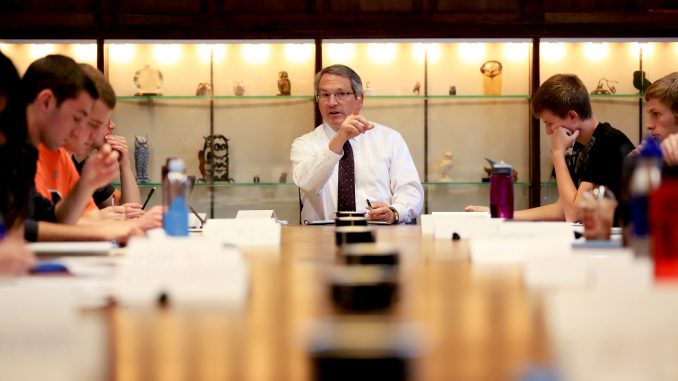
It’s their date night.
But before President Neil Theobald and his wife, Sheona Mackenzie, could head off to dinner at Butcher and Singer in Center City, the couple of 31 years bonded in a way that only a lifelong professor and a retired school psychologist can: they taught.
Nestled in a conference room on the second floor of Sullivan Hall, a room normally reserved for high-level administrative and Board of Trustees committee meetings, the two are joined each Monday by a graduate assistant and 24 freshmen for a one-hour, one-credit class focusing on organizational change by tackling a different problem facing Temple each week.
The subject of the third class of the semester was the finances of Temple University Hospital, something the president said keeps him up at night.
“This is the issue that wakes me up at 3 a.m. and I can’t get back to sleep,” Theobald said, seated at the end of the conference table across from his wife. “That’s kind of the nightmare of my life.”
Over the next hour, students exchanged ideas and feedback with the president, questioning different aspects of the health system and offering solutions to the hospital’s financial situation.
When one student proposed shutting down the emergency room to cut costs, he quickly offered the freshman a lesson in business.
“In management, you never threaten anything you’re not willing to do,” Theobald said.
For Theobald, who is entering his 10th month as president, the class is an opportunity to continue something he has been echoing since he was named president last year: gauge the issues facing Temple from those experiencing it. But it also presents an occasion where he can pass along management skills in the process.
“I’m in a position right now where I can almost share learning with them,” he said. “There’s a set of skills in managing and changing an organization and that’s what we’re going to be talking about.”
Prior to the start of his first semester in January, Theobald said in an interview with The Temple News that the class would allow him to get a feel for the campus and what students think about ongoing issues at the university.
Earlier this year, Theobald expressed the appeal of teaching this particular class when he said he sees enormous benefit in “staying in touch with a group of students and not only them, but then through them, the things that they’re involved with, just so I know what’s going on on campus beyond what comes into this office.”
The class will take on a different mold in the spring when the students – who are all President’s Scholars – will break up into teams to create solutions to issues facing Temple.
For students like Connor Magura, a freshman biology and pre-med major, the class allows an approach to real-life problems in the classroom, which gives a “one-on-one feel” with the president.
“It’s an amazing opportunity,” Magura said.
For others, like neuroscience and psychology double major Samantha Rogers and design major Robin Zheng, the interaction between students and the university’s chief administrator is the most important part of the class.
“It really gives you an inside view of how complex a university is to run,” Zheng said. “You’re placed in the seat of a university president and see what he deals with.”
“The behind-the-scenes look into the university is what I like about the class,” Rogers said. She added that the second class of the semester was held in the president’s apartment in Rittenhouse Square, where they shared tea and scones.
The class’ graduate assistant, Pat Barbro, said having class at the president’s residence was “nice for them to see where they live and to get to know the students on a more personal level.”
For Barbro, the class introduces students to some issues facing the university that he didn’t even know about.
“They get to find out things and issues that they never would have found out about without this course,” Barbro, a Ph.D. student in marketing, said.
For Theobald, though, one of the class’ most important aspects is the interaction between him and his wife.
“This is reality, this is how we actually make decisions,” Theobald said. “She and I talk about things a lot and she’ll see things that I don’t see. It gives students an idea that there isn’t just one way to look at things, there will be another perspective to consider and you have to figure out how to meld those together.”
Contact Sean Carlin at sean.carlin@temple.edu or follow on Twitter @SeanCarlin84.



Be the first to comment